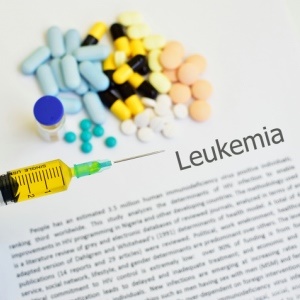
Imagine you had a life-threatening cancer that a wonder drug had kept in remission for years. Would you risk quitting?
Malignant daughter cells
New cancer treatment guidelines in the US say certain patients can consider stopping Gleevec or similar drugs which were long thought to be needed for the rest of their lives. It's just a pill or two a day but the drugs are expensive and have side effects.
A European study recently found it's safe for carefully selected patients to try, and a US study hoping to confirm that just finished enrolment. With these international studies underway it might be just a matter of time before South African patients can also benefit from the findings.
According to the National Cancer Registry, in South Africa in 2011, 437 males (1.38% of all cancers) and 313 females (0.97% of all cancers) were diagnosed with leukaemia.
Thousands of people with a blood cancer called chronic myelogenous leukaemia (CML) now have that choice.
A reviewed Health24 article on leukaemia defines the disease as follows: Leukaemia is a cancer of the blood forming cells. It starts from a single immature cell that becomes abnormal. Over time, several changes take place in that cell before it becomes malignant. Once it is malignant, the cell keeps producing large numbers of malignant daughter cells, some of which mature, and some of which remain as immature as the original abnormal cell.
To stop or not
"Our goal is to truly cure CML, which is essentially to have patients off drug," said Dr Ehab Atallah, a leukaemia expert at the Medical College of Wisconsin who helps lead the US study. "We're hoping to figure out better who can and cannot stop."
Some patients want to try, but others won't dare.
"Like playing Russian roulette," said Jee-Won Schally, 54, a former history teacher from Milwaukee who has taken Gleevec for 10 years and doesn't want to stop.
Nor does Doug Jensen, 83, a retired engineer near Portland, Oregon, who still gets the drug for free because he was in the original study that proved it worked.
'I felt like I was cured'
But for Nina Schlidt, quitting a similar drug nearly two years ago was wonderful and "financially, a godsend". The 67-year-old suburban Milwaukee woman's husband delayed retiring until 70 to keep insurance to cover her drug, which would have cost her thousands.
Meghann Bell, 38, a marketing director in Seattle, went off Gleevec in 2010 to start a family because the drug isn't safe during pregnancy. She resumed after the birth, then decided to go off again two and a half years ago.
"I kept thinking how I had been in remission" during pregnancy, she said. "I felt like I was cured and really didn't want to be on this drug for all my life."
CML, which starts in the bone marrow, has long been unique. Some other types of cancer, such as breast or colon, are treated with surgery or a course of radiation or drugs and the tumour either is gone or not, and may or may not recur. But once CML develops, it has been considered a lifelong threat. It's almost always caused by a gene flaw that usually develops during life, versus one that is inherited.
Gleevec blocks the gene's activity in more than 90% of patients. The drug's approval in 2001 turned CML from a fatal disease to a chronic condition for most people, and 36 000 to 100 000 Americans are living with it now, the Leukemia & Lymphoma Society estimates.
Two similar drugs, Tasigna and Sprycel, also are sold, and generic Gleevec came out last year. Treatment costs $60 000 to $150 000 (±R800 000 to R2m) a year. Even with insurance, copays run $1 000 to $24 000 (±R13 000 to R24 000) a year, and Schally had to meet a $10 000 (±R130 000) deductible.
Deep remission
Side effects can include fatigue, nausea, chronic diarrhoea, muscle pain and skin rashes. Meals have to be timed carefully around some pills. Many patients want to quit, but the thinking was that they would always need treatment, the way some people need insulin to control diabetes.
Now, though, research suggests that long treatment may eliminate so many cells with the bad gene that the immune system may be able to keep the disease in check if it starts to return.
At an American Society of Haematology meeting in December, Dr Francois-Xavier Mahon of the University of Bordeaux in France reported a study of 750 patients who stopped treatment after being in deep remission with no sign of disease in their blood for at least a year. After six months without treatment, 62% had maintained a deep remission, and 52% still had after two years. Most who relapsed were able to regain deep remission after resuming treatment, and none developed advanced disease, he said.
Half a dozen smaller studies have been done, and "the data are all the same and it all looks good", said Dr Kendra Sweet of the Moffitt Cancer Centre in Tampa. She helped draft new National Comprehensive Cancer Network guidelines that say it's reasonable to consider stopping treatment in people who have been in deep remission for at least two years, with close monitoring.
A 50-50 chance
Not only some patients are wary, some doctors are too.
"If I can keep a patient on medicine, I do," said Dr Mikkael Sekeres, the Cleveland Clinic's leukaemia chief and a spokesman for the Haematology Society. "There are those of us who don't think you can cure the disease with long-term treatment," that eventually it will come back.
But Gleevec's discoverer, Dr Brian Druker, head of Oregon Health & Science University's cancer centre, sees it differently. Nearly half of his 250 patients would be eligible to try quitting. So far, 49 have and only 18 have had to resume.
"When I discuss it with patients, I say there's a 50-50 chance you'll be off therapy and a 1% risk that your leukaemia will become resistant to treatment," Druker said. "Those are pretty good odds."
Read more:




 Publications
Publications
 Partners
Partners
















